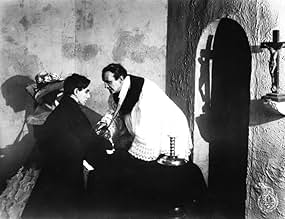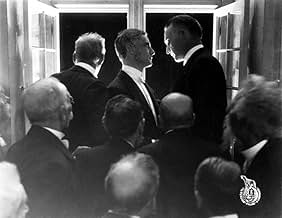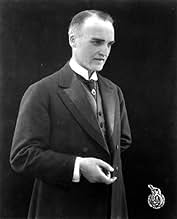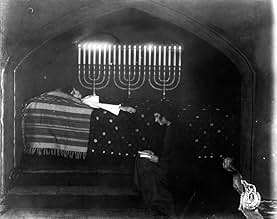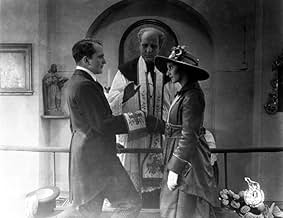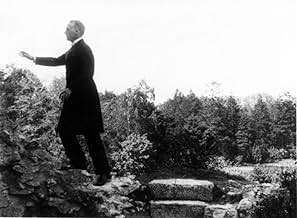IMDb RATING
6.6/10
1.1K
YOUR RATING
A judge sees his illegitimate daughter facing a trial for the murder of her newborn child, also out of wedlock. He is certain that she will be sentenced to death.A judge sees his illegitimate daughter facing a trial for the murder of her newborn child, also out of wedlock. He is certain that she will be sentenced to death.A judge sees his illegitimate daughter facing a trial for the murder of her newborn child, also out of wedlock. He is certain that she will be sentenced to death.
- Director
- Writers
- Stars
Carl Walther Meyer
- Rigsherre von Sendlingen
- (as Carl Meyer)
- Director
- Writers
- All cast & crew
- Production, box office & more at IMDbPro
Featured reviews
It did seem to be a good film but i had trouble reading quite a few of the captions. The writing was too small and because of this it was hard to follow the storyline.
This film by Carl Dreyer is titled 'The President' in the old-fashioned European sense of the word 'president': the title character is the presiding official of a European town; not quite the mayor, nor quite the chief magistrate. Like its title, this entire film is very much a product of the fading days of imperial Europe. The film's premise takes it for granted that aristocratic noblemen are somehow innately different from the common folk, with a different set of priorities, a different set of duties, and a different form of justice.
The film is set in 19th-century Denmark. The main plot is some hoo-ha about a greying blue-blood (Halvard Hoff) who must preside over the trial and sentence of a young governess (Olga Raphael-Linden) accused of murdering the child in her charge. The governess pleads guilty, but for some reason she's going to be put on trial anyway. (I know nothing about 19th-century Danish law; would a defendant who pleads guilty to a capital offence be made to stand trial?) The president abruptly learns that the governess is his own daughter, born of a tryst with a working-class woman whom he didn't marry due to their social disparity. Naturally, because this total stranger is his own daughter he must now intercede. What follows is mostly deepest bathos.
The action of this sprawling movie takes place over three generations. Two of the actors in this film (Hoff and Elith Pio) each play their characters at two radically different ages; unfortunately, the old-age makeup on these two young actors is very unconvincing. Also unconvincing is the hairpiece worn by Richard Christensen (the best actor in this film) as the governess's defence advocate. I was distressed that Christensen bears a striking resemblance to Michael Palin. Talking of makeup: the governess wears lip rouge in her death cell.
Whoever handled the set dressing on this movie should have cut down on the caffeine: one character's home is decorated with dozens of silhouette portraits, while another character's home is festooned with miniatures arranged in geometric patterns. The keys for the cells in the local prison are hung on a wall-rack shaped like a bat; it looks like it would have been more appropriate in Dreyer's film 'Vampyr'. One shot in this movie, depicting a servant seen only in shadow, reminded me of a famous shot in 'Vampyr'.
In all the long length of 'The President', Dreyer's camera hardly ever moves and always does so clumsily. Fortunately, Dreyer's static camera gives us some strikingly beautiful compositions. All of his exteriors are exquisitely framed and lighted. (I wonder if he used reflectors.) A few brief sequences are rather obviously shot day-for-night. I was impressed by one shot when lovers meet on a bridge; we see their reflections in the water rather than the lovers themselves.
There are a few weird lapses here. One character wears spectacles in medium-long shot, then Dreyer cuts to him in close-up and the spectacles are gone. The president's cook carries live terriers in a closed satchel with no airholes, to no ill effect. The cook is played by Fanny Petersen, who strongly resembles Beryl Mercer, one of the most annoying actresses in film history.
'The President' has many flaws, most notably a turgid and overly complicated storyline. However, Dreyer's directorial skill is manifest here, and most of his actors give good performances. I'll rate this deeply old-fashioned movie 6 out of 10.
The film is set in 19th-century Denmark. The main plot is some hoo-ha about a greying blue-blood (Halvard Hoff) who must preside over the trial and sentence of a young governess (Olga Raphael-Linden) accused of murdering the child in her charge. The governess pleads guilty, but for some reason she's going to be put on trial anyway. (I know nothing about 19th-century Danish law; would a defendant who pleads guilty to a capital offence be made to stand trial?) The president abruptly learns that the governess is his own daughter, born of a tryst with a working-class woman whom he didn't marry due to their social disparity. Naturally, because this total stranger is his own daughter he must now intercede. What follows is mostly deepest bathos.
The action of this sprawling movie takes place over three generations. Two of the actors in this film (Hoff and Elith Pio) each play their characters at two radically different ages; unfortunately, the old-age makeup on these two young actors is very unconvincing. Also unconvincing is the hairpiece worn by Richard Christensen (the best actor in this film) as the governess's defence advocate. I was distressed that Christensen bears a striking resemblance to Michael Palin. Talking of makeup: the governess wears lip rouge in her death cell.
Whoever handled the set dressing on this movie should have cut down on the caffeine: one character's home is decorated with dozens of silhouette portraits, while another character's home is festooned with miniatures arranged in geometric patterns. The keys for the cells in the local prison are hung on a wall-rack shaped like a bat; it looks like it would have been more appropriate in Dreyer's film 'Vampyr'. One shot in this movie, depicting a servant seen only in shadow, reminded me of a famous shot in 'Vampyr'.
In all the long length of 'The President', Dreyer's camera hardly ever moves and always does so clumsily. Fortunately, Dreyer's static camera gives us some strikingly beautiful compositions. All of his exteriors are exquisitely framed and lighted. (I wonder if he used reflectors.) A few brief sequences are rather obviously shot day-for-night. I was impressed by one shot when lovers meet on a bridge; we see their reflections in the water rather than the lovers themselves.
There are a few weird lapses here. One character wears spectacles in medium-long shot, then Dreyer cuts to him in close-up and the spectacles are gone. The president's cook carries live terriers in a closed satchel with no airholes, to no ill effect. The cook is played by Fanny Petersen, who strongly resembles Beryl Mercer, one of the most annoying actresses in film history.
'The President' has many flaws, most notably a turgid and overly complicated storyline. However, Dreyer's directorial skill is manifest here, and most of his actors give good performances. I'll rate this deeply old-fashioned movie 6 out of 10.
"The President", known as Carl Theodor Dreyer's first feature-length film, includes a trial scene, solved in a traditional way, a strong contrast with his famous masterpiece "Passion of Jeanne d'Arc". In general, the "mise-en-caméra" is rather conventional, except for a couple of shots, both related to romantic situations in which the filmmaker was "inspired": one is a overhead shot of a kiss, the other two lovers' reunion on a bridge reflected on a pond. There are a few silly distracting shots dealing with puppies; one or two inserts seemingly erroneous, but in any case, it is an enjoyable viewing, and Dreyer's ethical considerations and spiritual leaning –which reached a sublime level in "Ordet"- are already sketched here.
Carl Theodor Dreyer had a history as a writer, and it shows in his first feature film as a director, The President. There's a literary aspect to the production that emphasizes character and structure that gives the film's final resolution a surprising amount of satisfaction. However, being the first film of a filmmaker so early in the history of cinema, there's a roughness and simplicity to a lot of the production that ends up feeling a bit like a drag, especially from certain moments in performance. It's a surprisingly solid first effort from the former reporter.
The film is the story of really three generations of male failure regarding women. It starts with a prologue as the elder and aristocratic von Sendlingen takes his adult son, Karl Victor, on a walk through their ruined castle and tells him the tale of how he married his mother. She was the daughter of a servant that he wooed and impregnated, eventually trying to run away from his responsibilities before Karl Victor's grandfather made von Sendlingen marry the girl. For, he says, a von Sendlingen may mess up from time to time, but they can never be a villain. The lesson to the self-described wretch von Sendlingen is that Karl Victor must never marry a commoner.
Skip ahead thirty years, and Karl Victor is the president of a tribunal (essentially a public defender, it seems) in his small Danish town. He's an incredibly well-respected member of the community, well on his way up to bigger and better things. He's presented with a case in his professional capacity that affects him deeply, though. This is a moment where the amateurish acting leaps off the screen, as Elith Pio, as Karl Victor, throws himself around in torment for his internal qualms. It feels wrong, histrionic, and overbearing. Anyway, the issue is that his illegitimate daughter, Victorine, has been arrested for murdering her baby.
One of the interesting things about the film is that it's built around a series of flashbacks. The first was von Senglingen telling of his time as a youth that led to his marriage. The second is Karl Victor describing to his friend, Georg Berger, how he fell for Victorine's mother, his cousins' governess, but backed away from marrying her because of the promise he made to his father. Their daughter, conceived illegitimately, ended up as Victorine, a girl who struggled to survive just like her mother, eventually becoming the governess to a harsh mistress. Her story of falling in love with her mistress's son. When she became pregnant, the son cowardly went away for months and wrote the truth to his mother who kicked Victorine out of the house in the middle of the night. Now, it's a bit unclear, probably for taste reasons, how Victorine went from struggling alone in the dark of night to collapsed on the ground with her dead child next to her, but I assume she had a premature birth that ended with her child dying. It's never said or shown, but I believe that's what happened. I think this effort to tastefully present something ugly probably goes a bit too far to the point where it's simply unclear what actually happened.
The tribunal splits almost evenly, deciding that Victorine does deserve death for her crimes despite Georg Berger's impassioned defense of the situations of the crime. This is where the movie gets really interesting.
Karl Victor is torn by all of this. If he had accepted Victorine's mother, Victorine would never have been put into that situation. He could have protected her. He even refused to protect her in his official capacity as president of the tribunal. His dual loyalties to his illegitimate daughter and to justice and in conflict within him, and he decides that he must break the law when he learns that a plea for clemency gets denied. He decides that he's going to break her out of prison and find a way to give her the life he denied her.
There's something wonderful in how this plays out. There's a dinner in celebration of Karl Victor's great history as a justice before he is to move on to another post, a dinner that he leaves early to break Victorine out of prison. He gets her away, gives her away to a man at a wedding out in the country (who this man is ends up never terribly well explained, a small issue with the finale since he's not really the point), and goes back to the village for punishment which ends up denied for his actions, if made public, would raise questions about the sanctity of justice in the people.
So, there's some stuff holding the film back. The acting doesn't gel all the time. There are interesting designs on walls that contrast with the otherwise spare look, but I don't think they mean anything (I could very well be wrong about that, by the way). The husband to Victorine at the end just shows up, is described as a plantation owner, and has no other characterization. A lot of framing is pretty mundane, silent film stuff. However, there's a lot to really enjoy. There's obvious talent on display with something to say about the plight of women and the responsibilities of men. There are individual shots that are quite striking (like a shot of von Sendlingen and his commoner mistress on a small boat on a river that stays in my mind). I have a feeling that this Carl Th. Dreyer person may have some more good movies in him.
The film is the story of really three generations of male failure regarding women. It starts with a prologue as the elder and aristocratic von Sendlingen takes his adult son, Karl Victor, on a walk through their ruined castle and tells him the tale of how he married his mother. She was the daughter of a servant that he wooed and impregnated, eventually trying to run away from his responsibilities before Karl Victor's grandfather made von Sendlingen marry the girl. For, he says, a von Sendlingen may mess up from time to time, but they can never be a villain. The lesson to the self-described wretch von Sendlingen is that Karl Victor must never marry a commoner.
Skip ahead thirty years, and Karl Victor is the president of a tribunal (essentially a public defender, it seems) in his small Danish town. He's an incredibly well-respected member of the community, well on his way up to bigger and better things. He's presented with a case in his professional capacity that affects him deeply, though. This is a moment where the amateurish acting leaps off the screen, as Elith Pio, as Karl Victor, throws himself around in torment for his internal qualms. It feels wrong, histrionic, and overbearing. Anyway, the issue is that his illegitimate daughter, Victorine, has been arrested for murdering her baby.
One of the interesting things about the film is that it's built around a series of flashbacks. The first was von Senglingen telling of his time as a youth that led to his marriage. The second is Karl Victor describing to his friend, Georg Berger, how he fell for Victorine's mother, his cousins' governess, but backed away from marrying her because of the promise he made to his father. Their daughter, conceived illegitimately, ended up as Victorine, a girl who struggled to survive just like her mother, eventually becoming the governess to a harsh mistress. Her story of falling in love with her mistress's son. When she became pregnant, the son cowardly went away for months and wrote the truth to his mother who kicked Victorine out of the house in the middle of the night. Now, it's a bit unclear, probably for taste reasons, how Victorine went from struggling alone in the dark of night to collapsed on the ground with her dead child next to her, but I assume she had a premature birth that ended with her child dying. It's never said or shown, but I believe that's what happened. I think this effort to tastefully present something ugly probably goes a bit too far to the point where it's simply unclear what actually happened.
The tribunal splits almost evenly, deciding that Victorine does deserve death for her crimes despite Georg Berger's impassioned defense of the situations of the crime. This is where the movie gets really interesting.
Karl Victor is torn by all of this. If he had accepted Victorine's mother, Victorine would never have been put into that situation. He could have protected her. He even refused to protect her in his official capacity as president of the tribunal. His dual loyalties to his illegitimate daughter and to justice and in conflict within him, and he decides that he must break the law when he learns that a plea for clemency gets denied. He decides that he's going to break her out of prison and find a way to give her the life he denied her.
There's something wonderful in how this plays out. There's a dinner in celebration of Karl Victor's great history as a justice before he is to move on to another post, a dinner that he leaves early to break Victorine out of prison. He gets her away, gives her away to a man at a wedding out in the country (who this man is ends up never terribly well explained, a small issue with the finale since he's not really the point), and goes back to the village for punishment which ends up denied for his actions, if made public, would raise questions about the sanctity of justice in the people.
So, there's some stuff holding the film back. The acting doesn't gel all the time. There are interesting designs on walls that contrast with the otherwise spare look, but I don't think they mean anything (I could very well be wrong about that, by the way). The husband to Victorine at the end just shows up, is described as a plantation owner, and has no other characterization. A lot of framing is pretty mundane, silent film stuff. However, there's a lot to really enjoy. There's obvious talent on display with something to say about the plight of women and the responsibilities of men. There are individual shots that are quite striking (like a shot of von Sendlingen and his commoner mistress on a small boat on a river that stays in my mind). I have a feeling that this Carl Th. Dreyer person may have some more good movies in him.
Praesidenten is a film about the crucial conflict between the (conservative) codes of society and individual moral.
It tells the story of a grandfather, father and son of a well respected family who all make the same mistake and fall in love with a common girl.
They all have to resolve the problem in a way acceptable to the society they live in but must consequently suffer the inner guilt that inevitably follows.
Finally, late in his life the son, whose a respected judge in a small town, gets a chance to redeem himself and his ancestors by doing the right thing morally but also severely breaking the law in doing so.
This highlights the conflict between the personal and the societal spheres of right and wrong in a spectacular way, especially as Dreyer depicts the other local men of power as only concerned with how the incident would affect their status in society.
Dreyer uses flashback- structure in a very efficient and economical way to build the comparisons between the different times portrayed in the film. Furthermore: in this our digital age of fast editing and overflow of image it is most gratifying to see a film that has a complex point to make and manages to do that almost effortlessly with a minimum of "hassle". The direction is so economic it almost hides the mastery of cinematic vision behind it to the untrained eye.
It tells the story of a grandfather, father and son of a well respected family who all make the same mistake and fall in love with a common girl.
They all have to resolve the problem in a way acceptable to the society they live in but must consequently suffer the inner guilt that inevitably follows.
Finally, late in his life the son, whose a respected judge in a small town, gets a chance to redeem himself and his ancestors by doing the right thing morally but also severely breaking the law in doing so.
This highlights the conflict between the personal and the societal spheres of right and wrong in a spectacular way, especially as Dreyer depicts the other local men of power as only concerned with how the incident would affect their status in society.
Dreyer uses flashback- structure in a very efficient and economical way to build the comparisons between the different times portrayed in the film. Furthermore: in this our digital age of fast editing and overflow of image it is most gratifying to see a film that has a complex point to make and manages to do that almost effortlessly with a minimum of "hassle". The direction is so economic it almost hides the mastery of cinematic vision behind it to the untrained eye.
Did you know
Details
- Runtime1 hour 25 minutes
- Sound mix
- Aspect ratio
- 1.33 : 1
Contribute to this page
Suggest an edit or add missing content


